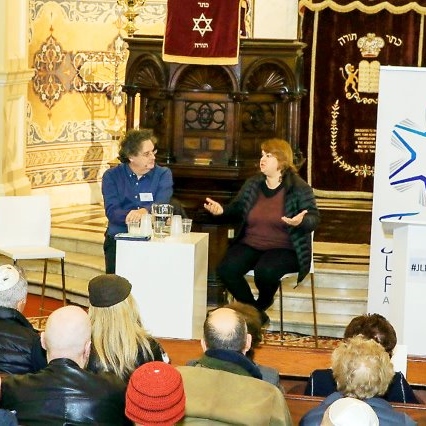News
Nice girl delves into shady underworld
“How does a nice girl like you end up in a place like this?” So Adjunct Professor of journalism at Wits University, Anton Harber, asked author and radio journalist Mandy Wiener at the second Jewish Literary Festival in Cape Town on Sunday. They were discussing her latest book, Ministry of Crime: An Underworld Explored.

MOIRA SCHNEIDER
Wiener replied that she always knew that she was going to be a journalist. She had grown up in a home where the radio was always on, newspapers were read, and she had always been quite aware of the news.
“Because of [her first book] Killing Kebble, I became a specialist in the underworld, with these compelling characters who are quite charismatic – even fascinating,” she said, describing them as “regular people with alter egos”.
“I try to be non-judgemental. I’m not out there to criticise or hold them to account.” For this, she has been criticised on radio by forensic investigator Paul O’Sullivan for giving them a platform. Asked by Harber if there was a risk she was being used to spin a tale, she said: “Certainly, I think journalists are often used. I put all the different versions [of a story] on record in the book, and let people decide for themselves.
“I’ve realised objectivity is a complete myth. Some things you just cannot be objective about.”
But, Harber continued, was it not the journalist’s job to test and verify, and not put out different versions? “Yes and no,” said Wiener.
She gave the example of the Lolly Jackson murder, where journalists had been putting out an untested version of the story for years, until George Luca said he had taken the fall for Radovan Krejcir. The journalists’ attitude was, “Paul O’Sullivan told us, so it must be true.”
Wiener said that journalists did not have the power to test different versions. “That is up to the criminal justice system. I still have faith in it.”
Noting that Wiener had been accused of being Krejcir’s number-one fan, Harber asked her if she was an O’Sullivan fan. “Paul is very complex,” she replied.
“He performs a very important function. He fills the void left by a crippled police force and justice system. He collected a lot of the evidence that brought down Jackie Selebi and Radovan Krejcir.
“But his methods are dubious. There are a lot of allegations against him though he’s never been convicted of anything.”
Asked what she believed his motivation was, Wiener said: “I think it’s ego. He likes to be seen as the person who brings down the bad guys.”
Referring to a deliberate campaign to eviscerate the National Prosecuting Authority, the South African Revenue Service, the Hawks, and Crime Intelligence, she said the net result was that several law-enforcement agencies were not capable of fighting organised crime.
Harber noted that the picture presented in the book was of a police and prosecutorial system that was “rotten to the core”.
“I would never say we are losing the fight against crime,” said Wiener. “There are still police officers and prosecutors who are doing fantastic work. But the capability to deal with very complex commercial crime is not what it should be.”
She appealed for “active citizenship”, saying that time and time again, civil society had turned things around.
Asked if she had been threatened by any individuals who were not happy with what she had published, Wiener quipped: “I’m a little disappointed to say no.”